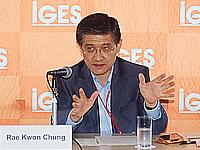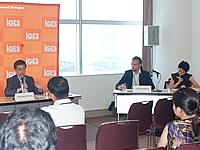- IGES Home
- ISAP Home
- ISAP 2012 Home
- Interactive Mr. Rae Kwon Chung
ISAP Interactive Session with Mr. Rae Kwon Chung
| Date / Time | 25 July 2012 11:00-12:00 |
|---|---|
| Venue | Pacifico Yokohama Room 511/512 |
| Guest speaker | Mr. Rae Kwon Chung, Director, Environment and Development Division, United Nations Economic and Social Commission for Asia and the Pacific (UNESCAP) |
| Interviewers | Robert James Didham, Policy Researcher-Education Policy Specialist, IGES Chika Aoki-Suzuki, Policy Researcher, IGES |
| Facilitator | Zhou Xin, Economy and Environment Deputy Director, IGES |
Brief profile
Mr. Rae Kwon Chung, |
Key Discussion Points
---Sustainable development is traditionally recognised for its integration of the three pillars of environment, society and economy. On the surface, green growth appears to only address economy and environment. Would you please elaborate on how social aspects and development issues are integrated into and pursued under a green growth approach?
Green growth provides an approach for harmonising economic and environmental activities which aims to transform the idea that there must be conflicts between green, pro-environmental activities and pursuing economic growth. I also think that green growth is only one tool to help implement sustainable development, but because green growth does not address the social pillar of sustainable development, other tools are needed to ensure the holistically integration of the three pillars and for development activities to properly address issues such as poverty alleviation and social equity.---When considering a green growth approach, what acknowledgement is made of the existence of real and absolute limits to growth in terms of a resource constrained world? To put this in perspective, if we compare the level of Gross World Product of the present day to that at the beginning of the 20th century, we see that GWP has increased by 6,000% over that 110 year period. Does green growth propose that this level of economic growth is feasible to both continue over the next century and be reshaped in a way that limits negative environmental impacts?
 It is not feasible to have unbridled continuation of materialistic expansion, and thus green growth aims to strengthen a shift in economic focus from quantity to quality. For example, this economic focus should aim to enhance the level of value-added production and also to increase the efficiency of production and consumption cycles to achieve systems that consume the least to produce the most. In this way, efficiency can become the new driver of wealth, and to properly measure this approach. I would like to encourage a switch from GDP to measuring of net growth, as GDP contains within it numerous hidden losses that work against efficiency.
It is not feasible to have unbridled continuation of materialistic expansion, and thus green growth aims to strengthen a shift in economic focus from quantity to quality. For example, this economic focus should aim to enhance the level of value-added production and also to increase the efficiency of production and consumption cycles to achieve systems that consume the least to produce the most. In this way, efficiency can become the new driver of wealth, and to properly measure this approach. I would like to encourage a switch from GDP to measuring of net growth, as GDP contains within it numerous hidden losses that work against efficiency.---It would be valuable to measure the progress of green growth for countries to know their position on the achievement of green growth. What should be measured for green growth (for example, resource productivity, other material flow indicator, natural capital, GDP, or indicators beyond GDP) and how would these be measured? Also, what type of indicators are you expecting, for example, a set of indicators or one integrated headline indicator? How are you expecting to use indicators to inform and influence policy making? What kind of scenarios do you envision as possible outcomes from Rio20?
Green growth indicators are currently being prepared. The importance of the indicators is to give clear and strategic messages to policy-makers on specific activities and direction for greening the growth, such as indicators for energy policy, tax/subsidies for fossils fuels and incentives for promoting renewable energy. As described above, the main priority of a green growth approach and relevant indicators should be on efficiency maximisation, especially from a policy standpoint. I have found out the limitations of existing indictors such as EPI (Environment Performance Index) or ESI (Environment Sustainability Index). These are not fully reflecting policy needs. Green growth indicators should reflect the efficiency of growth, such as resource, energy, and policy efficiency, etc. Furthermore, by focusing on greening economic activities, one of the key objectives of this approach is to mainstream sustainable development in social and economic growth beyond the limitations of environmental ministry and to ensure that it becomes a holistic policy focus for the entire government.---Statistical deficiency can be the barrier to develop indicators, especially in developing countries in Asia and the Pacific. What do you think about the barriers? In addition to statistical deficiency, what is the most challenging part to develop indicators for green growth?
 We are thinking about developing ecological friendly indicators, which cover the three pillars of sustainable development (economy, environment and society). For example, competitiveness of an economy, ecological boundary due to resource constrains, inclusiveness of medical-care for the society, and indicators to reflect policy development. “Net growth”, which means GDP minus hidden GDP losses due to, for example, traffic congestion and ecological degradation, can be a good indicator. However, it is impossible to cover all elements. It is therefore necessary to select critical issues strategically. Indicators are not necessarily holistic indicators at this moment.
We are thinking about developing ecological friendly indicators, which cover the three pillars of sustainable development (economy, environment and society). For example, competitiveness of an economy, ecological boundary due to resource constrains, inclusiveness of medical-care for the society, and indicators to reflect policy development. “Net growth”, which means GDP minus hidden GDP losses due to, for example, traffic congestion and ecological degradation, can be a good indicator. However, it is impossible to cover all elements. It is therefore necessary to select critical issues strategically. Indicators are not necessarily holistic indicators at this moment.Observation of the interviewers/acknowledgements
Mr. Rae Kwon Chung, as Director of the Environment and Development Division of the United Nations Economic and Social Commission for Asia and the Pacific (UNESCAP), has been at the forefront of developing the concept of Green Growth. It is very interesting and informative to hear Mr. Chung’s observations on the definition and description of green growth and designing green growth indicators. Particularly inspiring was his proposal that green growth is not material growth and the fundamental way of growth should be changed from quantity growth to quality growth in achieving green growth. He also provided profound insights into indicator development that quality and efficiency should be key factors for policy-making.


 Go to top of page
Go to top of page